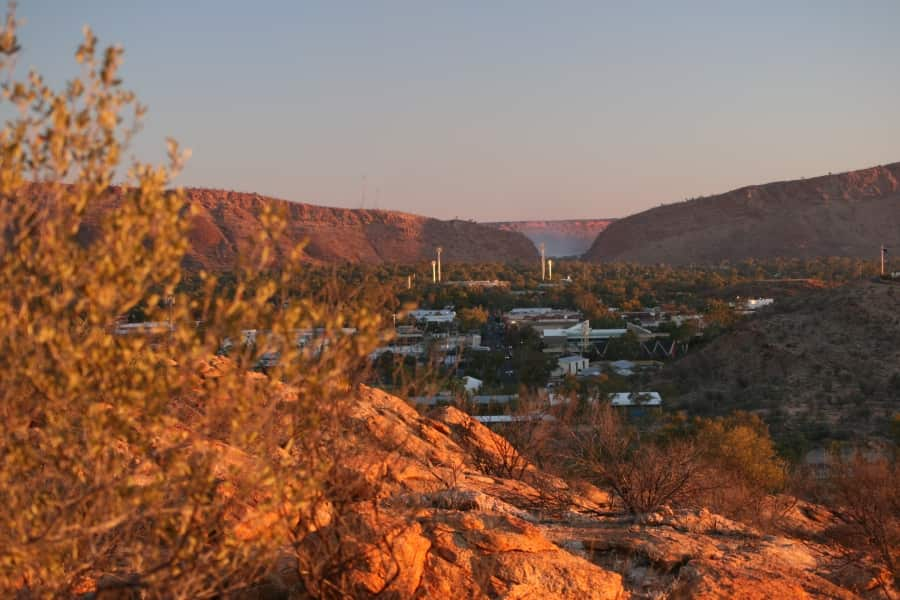Uncle William Tilmouth has seen alcohol bans come and go in his hometown of Mparntwe (Alice Springs).
He has little faith the new reforms, announced in response to the wave of unrest there, will be any different.
“I’ve lived long enough to see so many different strategies tried in this town in relation to alcohol, and I’m yet to see one that actually works,” he said.
After pressure from the Opposition and some media commentators, the Prime Minister and members of the federal government travelled to Alice Springs to meet with local organisations and hear their concerns and suggestions.
A raft of changes were announced, the biggest change: tough new alcohol restrictions.

Prime Minister Anthony Albanese alongside his First Nations colleagues during a press conference in Alice Springs, Northern Territory. Source: AAP / Pin Rada/AAP Image
Reduced trading and takeaways
For three months, the sale of takeaway alcohol will be banned on Mondays and Tuesdays, and bottle shops can only open between 3:00pm and 7:00pm on other days, while reduced takeaway alcohol trading on Sundays already exists.
One alcohol purchase per person per day will be introduced immediately under the Territory’s existing banned drinker register laws.
The government also announced the appointment of a Central Australian Regional Controller, Arrernte woman Dorrelle Anderson, who will coordinate programs in the township, an additional of $25m of the federal safety and community services funding with a further $14m will go to high visibility policing, $5.6 to emergency accommodation, and $2 million dollars for more security cameras for the town.
In the past 12 months, commercial break-ins in Alice Springs are up by 56 per cent, family violence by almost the same, and property crime is up by 60 per cent.
“The issue of youth on the streets and the issue of youth violence, of alcohol-fuelled violence are real. Let’s not pretend that they aren’t,” said Minister for Indigenous Australians Linda Burney.
The same old attitudes
But for Uncle William, the announcements are being sung from the same old song sheet.
The Arrernte Elder reflected on his teenage years in town, telling NITV he suffered the same rhetoric that young ones are facing now.
“This is an ongoing occurrence... every now and then there’s an explosion of behaviour.
"[But] there hasn’t been a time where Aboriginal kids weren’t scorned for being on the street at night. I remember when I was 16, there were the same attitudes then.”

A new era of alcohol restrictions have been ushered into the Central Australian hub, Alice Springs, with one resident saying it won't be the answer the town needs. Credit: Central Australian Aboriginal Congress
Those federal laws lapsed in July last year and the Territory government introduced an opt-in system effectively lifting alcohol bans in those communities unless they chose to remain dry.
In a major backflip, the Northern Territory government will look at reinstating the intervention-era alcohol restrictions by imposing an opt-out system rather than opt-in for town camps and remote communities, effectively banning alcohol in those areas unless they no longer wanted to remain dry.
'Listen to what Aboriginal people are saying'
In announcing the ban, Ms Fyles said community “called on government to step up and step in”.
But as far as Uncle William is concerned, this isn’t the answer community needed.
“They follow the same old same old failed solutions of yesteryear and nothing happens,” he said.
“It’s time that they start listening to what Aboriginal people are saying, [and] I mean Aboriginal people who suffer the greatest disadvantage, Aboriginal people who make up the statistics in the Closing the Gap reports.
“Those people are never ever consulted and therefore the results are not proven to be. It’s mainly people with prominence, power, position and privilege who get the opportunity to speak to the prime minister.”

Arrernte Elder and Chair of Children's Ground Uncle William Tilmouth has lived in Alice Springs his whole life, watching alcohol reform come and go.
Getting to the root of the problem
Uncle William is the Chairman of the national organisation, Children’s Ground, which works closely with Aboriginal youth in Alice Springs.
The organisation has issued a statement for the prime minister to come and sit with Children's Ground.
“It’s frustrating because he’s been captured by the status quo and people who have a vested interest in talking to him. Organisations that are more at the crisis level end of the line, as opposed to Children’s Ground who are more upstream,” he said.
READ MORE

10 impacts of the NT Intervention










